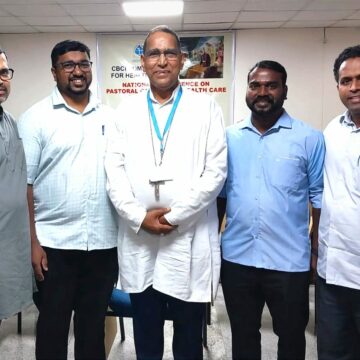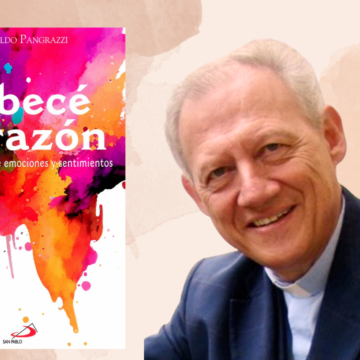Father Rosario Messina
 In his Bull for the Indiction of the Holy Year of Mercy the Pope writes at number 13: ‘We want to live this Jubilee Year in light of the Lord’s words: Merciful like the Father. The Evangelist reminds us of the teaching of Jesus who says, “Be merciful just as your Father is merciful”…It is a programme of life as demanding as it is rich with joy and peace’. And he adds at n. 15 of the same document: ‘Let us open our eyes and see the misery of the world, the wounds of our brothers and sisters who are denied their dignity, and let us recognize that we are compelled to heed their cry for help! May we reach out to them and support them so they can feel the warmth of our presence, our friendship, and our fraternity!...We cannot escape the Lord’s words to us, and they will serve as the criteria upon which we will be judged: whether we have fed the hungry’. ‘Come, you that are blessed by my Father! Come and possess the kingdom which has been prepared for you ever since the creation of the world’. ‘I tell you, whenever you did this for one of the least important members of my family, you did it for me’ (Mt 25: 34-35, 37-40). This is a short dialogue that is worth the whole of eternity. This exercise of corporal mercy, indeed, is a true journey, a pilgrimage on the road of grace that the Father wants to grant – through His Son Jesus – to the faithful as a gift of the Jubilee Year.
In his Bull for the Indiction of the Holy Year of Mercy the Pope writes at number 13: ‘We want to live this Jubilee Year in light of the Lord’s words: Merciful like the Father. The Evangelist reminds us of the teaching of Jesus who says, “Be merciful just as your Father is merciful”…It is a programme of life as demanding as it is rich with joy and peace’. And he adds at n. 15 of the same document: ‘Let us open our eyes and see the misery of the world, the wounds of our brothers and sisters who are denied their dignity, and let us recognize that we are compelled to heed their cry for help! May we reach out to them and support them so they can feel the warmth of our presence, our friendship, and our fraternity!...We cannot escape the Lord’s words to us, and they will serve as the criteria upon which we will be judged: whether we have fed the hungry’. ‘Come, you that are blessed by my Father! Come and possess the kingdom which has been prepared for you ever since the creation of the world’. ‘I tell you, whenever you did this for one of the least important members of my family, you did it for me’ (Mt 25: 34-35, 37-40). This is a short dialogue that is worth the whole of eternity. This exercise of corporal mercy, indeed, is a true journey, a pilgrimage on the road of grace that the Father wants to grant – through His Son Jesus – to the faithful as a gift of the Jubilee Year.
We who every day receive the Eucharistic Jesus in our hearts, let us address to him this grief-stricken prayer: ‘Dear Jesus, I worship you and I thank you, you are the true bread for the life of the world. I beseech you, place in my heart the wish and the will to move towards the very many creatures, above all children, who suffer from hunger in the world. They die and we waste! For this reason, when I say in the Lord’s Prayer ‘give us today our daily bread’, make sure that I do not think only of my family, of my parish, of my congregation or of my community but of all those poor people. May your presence warm my heart so that every day you give me the courage to deprive myself of something in order to give the hungry something to eat; open my eyes so that they can see the dramas, the anxieties and the vital needs of those who perhaps live next to me or on the outskirts of my city!’
Indeed, as Christians we have to return to imitating the Church of the beginnings. As we are told by St. Justine, who lived during the first half of the second century after Christ: ‘At the end of the celebration of the Eucharist those who have in abundance and want so to do should give as a much as they are pleased to give. What is gathered together should be deposited with he who presides, and he shall help orphans and widows and those who for sickness or other reasons are in need; then also those who are in prison and pilgrims who arrive from outside. In a word all those who are in need should be taken care of’ (St. Justine Cc, 66-67).
With the same faith that we treat Jesus in the Eucharist, we should treat Jesus in the hungry poor, in the sick, and in foreigners. In line with this principle, for example, the ancient medieval confraternities built hospitals next to basilicas which were as beautiful and as sumptuous as cathedrals, and to such an extent that they called them ‘Hotel Dieu’. Today one can still admire one of these next to Notre Dame in Paris. In addition, if we think about it, giving food to the hungry is the first work of corporal mercy, which after a certain fashion conditions the practicability of all the others: those who do not have food suffer the greatest poverty, from malnutrition to death. And we should not forget what is mentioned above, namely that in a hungry person it is Jesus himself who reaches out his arm. This was a truth that was strongly emphasised by St. Caesarius, the Bishop of Arles: ‘God on this earth is hungry in the person of all poor people…When a poor person is hungry, it is Christ who is hungry. Do not despise, therefore, the misery of the poor if you want to hope with certainty for forgiveness of your sins. Christ, my brethren, is hungry; he deigns to be hungry in all poor people; that which he receives on earth, he gives back in heaven’.
That old song which seemed to be intended to make children happy is instead a pleasant but also severe invitation addressed to adults, calling on us not only to open the front door of our homes but also that of our hearts in order to welcome at table a poor man or a guest who is passing through: ‘Add a place at table, there is another friend, if you move the chair a little you will be comfortable as well, it will double the happiness, the door is always open, the fire always alight, the hand always outstretched’. As we can all observe, this is not a song for children – it is a song for adults such as ourselves; it is a way of living our faith in a consistent way: the Eucharist and Charity. As regards priests, men and women religious, and the engaged lay faithful and believers, will we manage to make this very simple gesture which at the level of facts seems to be almost a little miracle? I remember with a great deal of nostalgia that my mother, who had seven children, as a simple woman tertiary Franciscan made this very beautiful gesture many times.














Camillians on Facebook
Camillians on Twitter
Camillians on Instagram